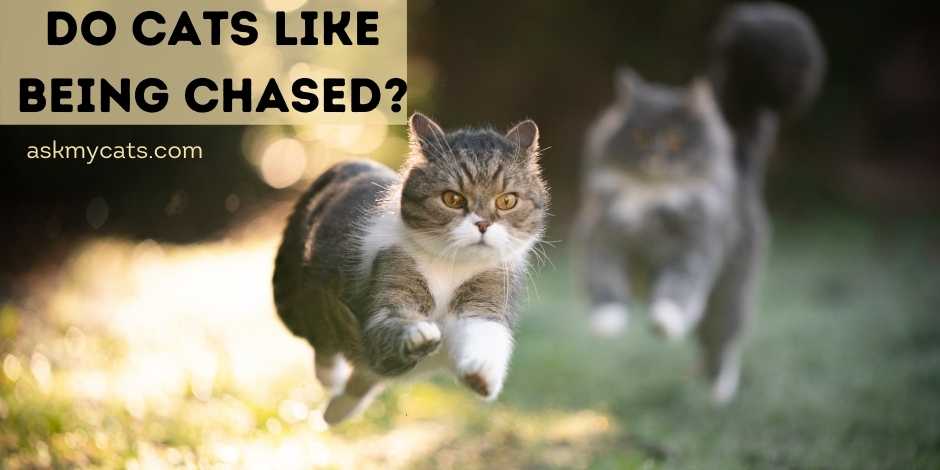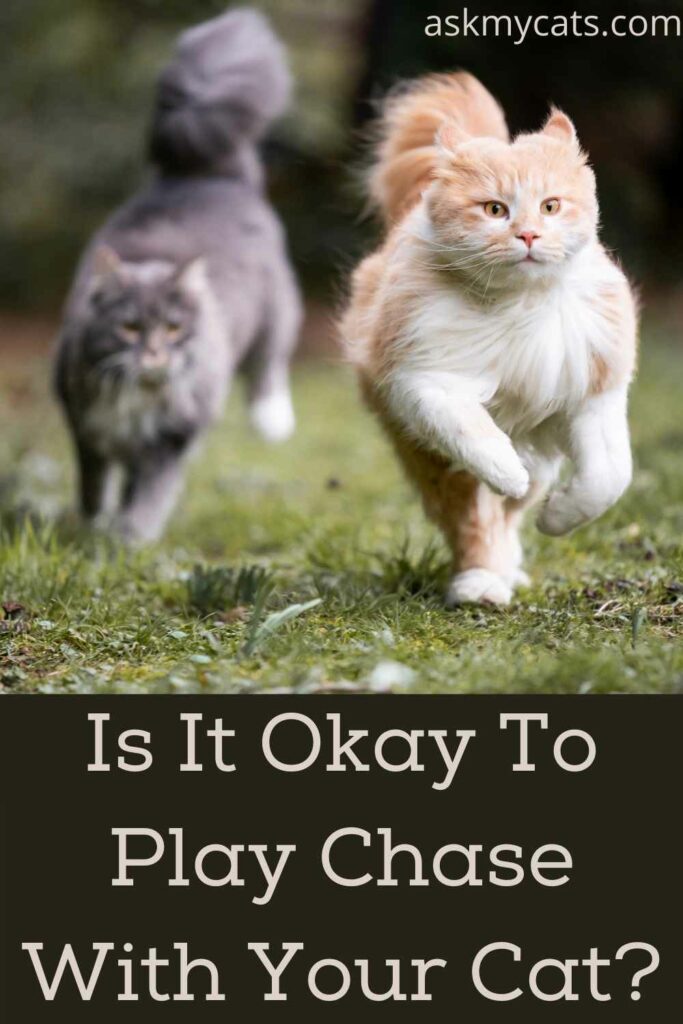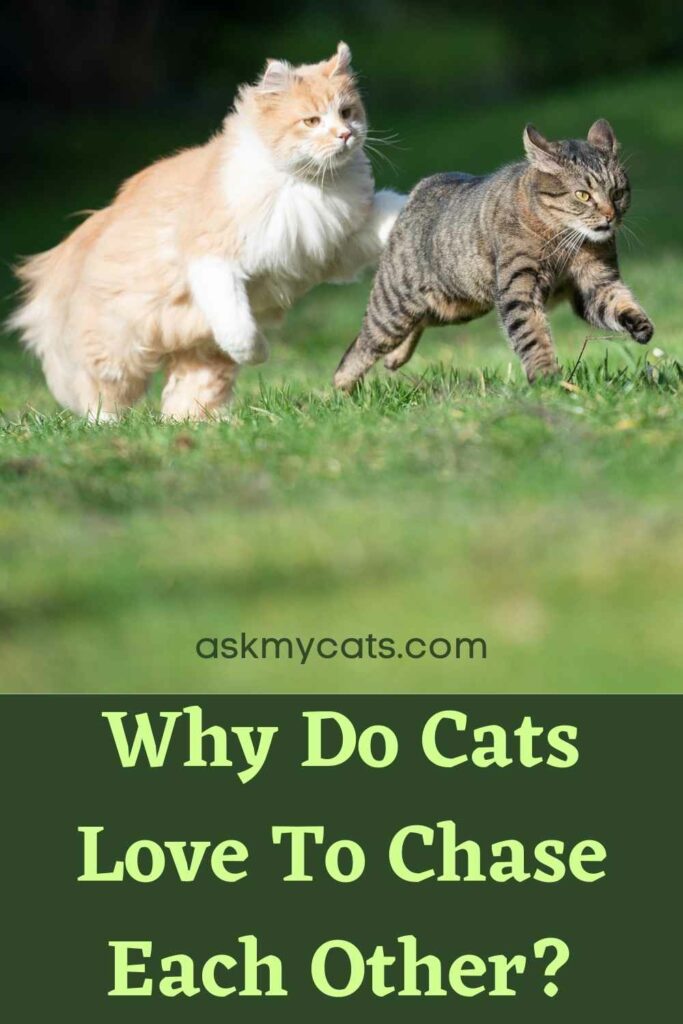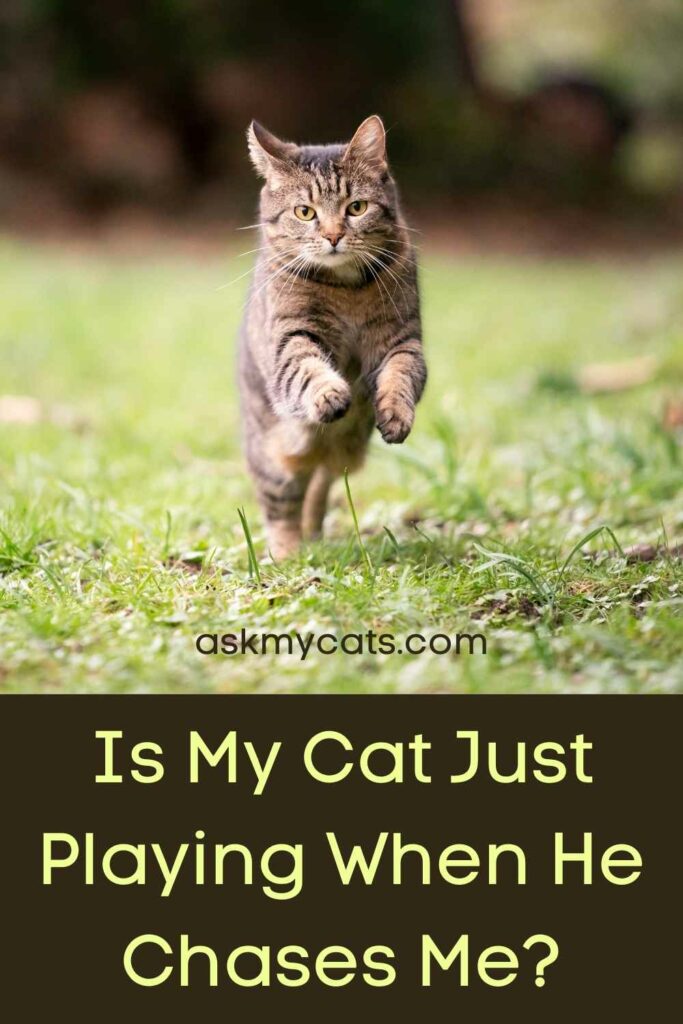Cats require playtime while they are young in order to develop and evolve into effective hunters, and most domestic adult cats find it enjoyable. The amount of play a cat likes depends on their age and mobility, but there are other methods to determine your cat’s activity levels.
Some cats love being chased by their owners during playing, especially if they get a reward at the end.
Cats who don’t enjoy being chased, on the other hand, may interpret this as hostile behavior. Pay close attention to your cat’s body language to see if they’re having fun with the game.
Continue reading if you want to improve your ability to understand your cat’s signs about whether they want you to run after them in a fun manner.


Give Your Cat the Perfect Day
Get the Free Ebook!
Why Do Cats Like Being Chased?
Cats enjoy being chased around. Cats, for the most part, like being chased by other cats or their human parents. That is especially true when there are rewards involved. Chasing your cat awakens the animal’s natural desire to play.
Many cats like being pursued because it enhances their natural play impulses.
Cats, like other pets, prefer to play by dashing about. Playing chase or play chasing is the common name for this behaviour.
Cats who like playing chase may even try to entice you to participate in the fun. The cat may appear to freeze and establish direct eye contact with you.
However, when you get closer, the animal dashes around in brief spurts before stopping and looking back to see whether you’re following.
Playtime is made much more fun by pausing and waiting for you to catch up. If you don’t follow along, some cats will meow or make other vocalizations to express their displeasure.
To tempt you to go seeking for them, they may hide in the next room or behind a pillar.
Cats who like chasing will try everything they can to entice you to join in the fun. In essence, these cats treat you the same way they do other cats.
1. 100% Agility
It’s worth mentioning that cats in the wild enjoyed playing with their own kind even before they were domesticated by humans. Chasing and playing fights were great ways to spend the time. It also enables cats to form social hierarchies and bond with one another.
Most significantly, play chasing helps cats enhance their reflexes and agility. As a result, it was an effective method of improving their hunting and self-defence abilities.
At home, there are, of course, fewer and less deadly creatures to chase. Even yet, if a cat feels that chasing him would help him develop his agility and reflexes, he will have you chase him.
2. Source for Stimulation
Cats may also like being chased since it motivates them. This is especially true of cats that aren’t given adequate physical or mental activity.
It’s vital to keep in mind that cats are often energetic pets. And, while they sleep for up to two-thirds of the period, they spend the other one-third grooming and roaming.
As a result, it’s critical to ensure that your cat is properly stimulated throughout his woke hours. The good news is that your cat may be stimulated in a variety of ways. Much of this will be covered in the next section.
Is It Okay To Play Chase With Your Cat?
It’s OK if you want to chase your cat around. Before you begin, make sure your cats are interested in the game, and keep an eye on their mood and anxiety as you play.

If your cat becomes overstimulated, he or she may begin to act violently. That’s a good indication that it’s time for your cat to take a break from chasing.
That question can be answered with a yes or a no. It all depends on what you want to accomplish by chasing your cat around.
If you’re playing chase with your cat to wear him out and help him release pent-up energy, it’s OK.
The only difficulty is that without your help, the cat may never be able to engage in any significant physical exercise.
Another reason you might try playing chase with your cat is because it enhances your love and affection for each other. Spending quality time with your cat will always help you develop a strong emotional bond with the animal.
Play chasing is a fantastic method to socialise your cat. It enables the cat to communicate more effectively with other members of the family as well as visitors.
However, before you begin chasing your cat, you should carefully observe the animal to see if he loves this type of engagement.
Some cats may not enjoy being chased about much less if the pursuit is carried out by a human rather than a cat. Worse still, some cats may mistake play chasing for aggressive or confrontational behaviour.
When a cat thinks you’re being too aggressive, he won’t flee in small spurts as he usually does. In order to get away from you, the animal may sprint and hide.
If you happen to be blocking the cat’s sole escape path and he feels cornered, the animal may attempt to flee by inflicting serious bodily harm on you.
Just because your cat became agitated once doesn’t mean you can’t continue to pursue him. Keep an eye on your cat and attempt to chase them down when they are calmer.
Your cat will definitely grow to love the game more as time goes on, and you’ll get better at recognizing when they’re ready to quit.
Before hunting a cat, it’s also vital to learn about his past. This is especially important if you adopt a cat from a shelter, since he or she may have an unrecorded history of trauma, abuse, or neglect.
Chasing may not always be interpreted as an invitation to play by such cats. Instead, they may see you as a threat, prompting a protective response.
A high-energy cat with a deep relationship with you is usually the ideal cat to chase. Even still, you should take it easy when play pursuing to see if the cat is enjoying himself. This entails paying attention to the cat’s social signs.
Also, don’t go overboard. Keep an eye out for indications of overstimulation while chasing your cat and stop immediately. Open-mouthed panting, weariness, anxiety, impatience, and aggressiveness are just a few of the symptoms.
- Freezing in place
- Piloerection or the standing up of hair
- Swatting or pawing in the air
- Staring directly into your eyes
- Excessive vocalization, such as hissing and growling
- Excessive spiting
- Biting and scratching
Most essential, never chase your cat if it simply serves to frighten it. To put it another way, never ambush or startle your cat since he may get terrified and violent.
Keep in mind that cats seek protection and security from their owners. As a result, frightening your cat may actually drive him away from you rather than attract him closer.
Do Cats Like To Be Chased By Dogs?
Cats and dogs don’t get along very well. As a result, your cat may be put off by the prospect of a dog chasing him.
Certain circumstances, on the other hand, may make it simple for your feline and canine family members to get along.
A cat, for example, will happily play with a dog if the cat is larger than the dog. This is particularly evident in families with bigger cat breeds such as Maine Coons but smaller dog types such as Boston Terriers.
Your cat will be less frightened by your dog and more ready to play with him if he is the larger animal.
Another circumstance in which your cat and dog could get along is if both animals are well-exercised and socialized. That involves providing adequate toys for both animals to avoid any possible bones of contention.
It also entails providing each animal with his or her own play space, eating area, grooming/petting time, and resting time.
Most essential, during their first meetings, you should appropriately introduce the animals to one another. This will allow them to appreciate the fact that they share a home and, as a result, will be able to play and spend more time together.
Why Do Cats Love To Chase Each Other?
Cats love playing chase with each other because it all relies on a lot of things, such as the cat’s age and breed, as well as the quantity of cats in your home.

1. Age
Adult cats are more energetic and playful than younger cats. Cats grow more lethargic and reclusive as they become older. So, if all other things remain constant, kittens are more likely than adult cats to enjoy play chasing.
Adult cats’ inaction, on the other hand, is not to be taken lightly. That’s because inactive lives come with a slew of hazards, including obesity, diabetes, hypertension, heart disease, and bone and muscle degeneration.
As a result, regardless of his age, you should make sure that your cat receives enough of exercise.
2. Number Of Cats
Cats are programmed to engage in chasing games amongst themselves. That’s particularly true if they get along.
Cats from the same litter are more likely to get along. The same is true for cats of different genders.
You’ll see a lot more play chasing among the cats themselves if your family has more than one feline member that gets along. If your kitty is an only cat, though, he will prefer to play chase with you.
Is My Cat Just Playing When He Chases Me?
Cats playfully pursue each other because your cat sees you as a large, funny-looking cat, and pursuing you is his or her way of letting you know that he or she wants to play.

Some cats love chasing one another. They could even make eye contact and then dart away at maximum speed to ‘ask’ you to play chase with them. Cats who like playing chase with their owners may regard you differently than they would another cat, particularly if they are an only cat.
Cats have a natural need to hunt things. They’re predators; therefore chasing things comes naturally to them. That urge is so intense in some cats that it will be triggered by your moving feet, which is especially true with kittens.
Cats enjoy chasing things, and most of the time, if your cat pursues you, it’s because she’s having a good time.
The majority of the time, cats’ pursuing behaviour is harmless. You’ll need to put a stop to it if the pursuit culminates with a pounce on your feet or ankles with fangs and claws clenched.
You may not need to stop your cat from chasing you if it stops short of pouncing. Here’s what you can do if it happens frequently or always ends with a pounce.
Keeping a toss toy in your pocket is a good idea. When your cat starts following or pursuing you, toss it away from you to divert his attention. Praise him for chasing the toy and, if you’re able, play fetch with him for a few minutes.
Increase your interactive play time with your cat in general. Use wand toys in particular to stimulate your cat to chase and pounce, which will help him to develop his hunting instincts.
If your cat can get these desires out at other times, he won’t feel as compelled to pursue and pounce on you. Just remember to put the wand toys away after you’re through, because your cat should only play with them when you’re around.
Change up your cat’s toys on a regular basis, and don’t leave too many out at once. Otherwise, your cat may grow bored and seek out something more fascinating to play with, such as your moving feet.
Frequently Asked Questions
Is it good to play fight with your cat?
Cats do not wrestle their prey to the ground, nor do they desire to be wrestled to the ground by an adult human. At that point, it’s no longer a fair game. Furthermore, if you wrestle your cat while she is on her back, she will assume a protective aggressive stance.
Do kittens like being chased?
You could learn that your cat enjoys chasing if you pay attention to their preferred pastime. Sudden staccato movements, dilated pupils, and playful vocalisation are among the few things I’ve observed my cats perform to grab my attention.
Do cats know when you ignore them?
Cats have social ties with people, as documented in a publication by Animals. They’re also perceptive to our signs of communication. As a result, cats can detect when their owners are neglecting them.
Final Words
Cats like being chased, particularly by other cats or their humans. In reality, chasing your cat for fun offers a lot of perks like it stimulates the cat, allowing him to practice his reflexes, and improves the relationship between the cat and his owner.
Cats who like being chased, on the other hand, may lack the drive to play on their own. Even if you like chasing your feline companion, it’s still important to provide him with enough of exercise and toys to keep him intellectually and physically stimulated.
Feel free to drop your questions in the comments section below!
